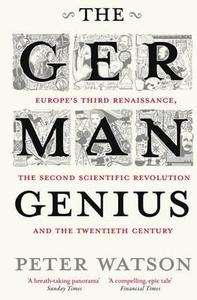The German Genius

Editorial Simon x{0026} Schuster Ltd
Fecha de edición agosto 2011
Idioma inglés
EAN 9781416526155
992 páginas
Libro
encuadernado en tapa blanda
Dimensiones 131 mm x 197 mm
Resumen del libro
From the end of the Baroque age and the death of Bach in 1750 to the rise of Hitler in 1933, Germany was transformed from a poor relation among western nations into a dominant intellectual and cultural force more influential than France, Britain, Italy, Holland, and the United States. In the early decades of the 20th century, German artists, writers, philosophers, scientists, and engineers were leading their freshly-unified country to new and undreamed of heights, and by 1933, they had won more Nobel prizes than anyone else and more than the British and Americans combined. But this genius was cut down in its prime with the rise and subsequent fall of Adolf Hitler and his fascist Third Reich-a legacy of evil that has overshadowed the nation's contributions ever since. Yet how did the Germans achieve their pre-eminence beginning in the mid-18th century? In this fascinating cultural history, Peter Watson goes back through time to explore the origins of the German genius, how it flourished and shaped our lives, and, most importantly, to reveal how it continues to shape our world. As he convincingly demonstarates, while we may hold other European cultures in higher esteem, it was German thinking-from Bach to Nietzsche to Freud-that actually shaped modern America and Britain in ways that resonate today.
Biografía del autor
Peter Watson nació en 1943, es historiador y periodista. Estudió en las universidades de Durham, Londres y Roma. Fue nombrado editor de New Society y formó parte durante cuatro años del grupo Insight de The Sunday Times. También ha sido corresponsal de The Times en Nueva York y ha escrito para The Observer, The New York Times, Punch y The Spectator. Es autor de trece libros, entre los que destacan Historia intelectual del siglo XX (Crítica, 2004), Ideas. Historia intelectual de la humanidad (Crítica, 2008), La gran divergencia (Crítica, 2012), La edad de la nada (Crítica, 2014) y Convergencias (Crítica, 2017); y ha presentado diversos programas de televisión sobre arte. Desde 1998 es asociado de investigación en el McDonald Institute for Archaeological Research, en la Universidad de Cambridge.<br>








